Smart Moves Summit sets out global vision for chess in education
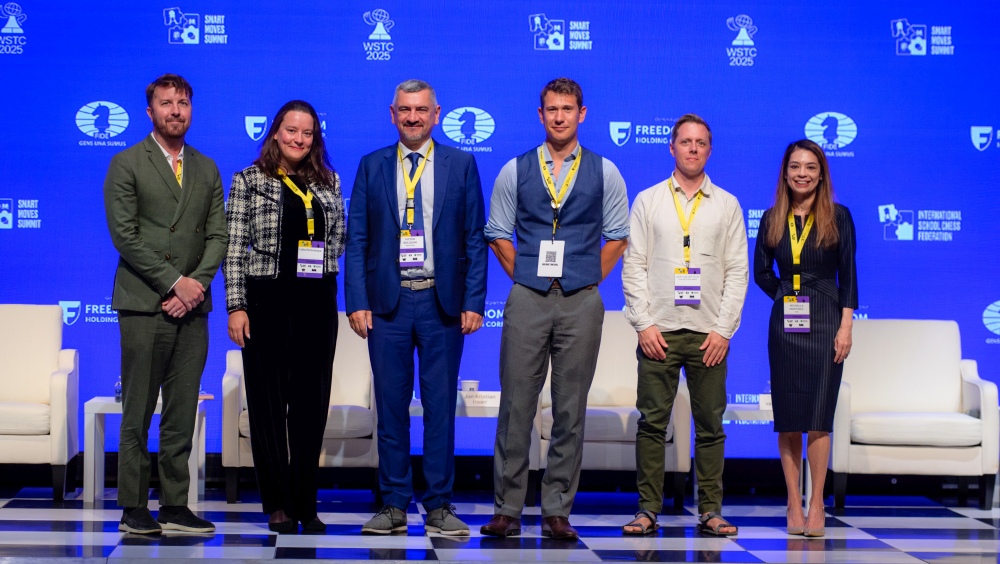
The first-ever global conference on the role of chess in education concluded in Washington D.C. today with a call to governments and education institutions to integrate chess into formal and informal learning environments, including schools. Over 50 speakers – including eminent scientists and researchers in the fields of education and cognitive studies, educators, coaches, leaders of state and international chess projects, chess-tech entrepreneurs, government officials and influencers – took part in the two-day event aimed at discussing the educational and cognitive benefits of chess. Organised by FIDE and the International Schools Chess Federation, and sponsored by the NASDAQ-listed Freedom Holding Corporation, the second day of the Smart Moves Summit saw lectures, panel discussions and presentations ranging from real human stories on how chess helped change the lives of people around the world, to building financially viable chess initiatives and private-public partnerships, to how social media is redefining the image of chess. The conference concluded with a declaration, setting the ground for a global effort to get national and international bodies and institutions to formally recognise and include chess in education and social programmes. The declaration calls for the integration of chess “into formal and informal learning environments, including public schools, after-school programmes, and digital platforms”. Steps to be taken include providing teacher training, curriculum framework, and evidence-based support to scale sustainable chess education programs. The signatories of the declaration have committed themselves to expanding access to chess education in underserved communities, addressing gender disparities and ensuring inclusive practices for children with disabilities, refugees and the displaced. True stories of chess changing lives The central panel discussion on the second day of the “Smart Moves Summit” titled “The power of chess to change lives”, offered a compelling look at how the game has transformed the fortunes of people from challenging backgrounds. Dr. Jenny D. Ingber, President & CEO of Chess in the Schools (pictured above), opened the session by recounting the journey of a young student named Eva, who went from a curious beginner to a confident competitor and mentor. Ingber emphasised that for many low-income students, chess serves as a “mirror, a ladder, a doorway” to a better future. “Chess does not care where you’re from, how much money your parents make or what language you speak,” Ingber said, “It only asks, can you think ahead?” Rochelle Ballantyne, a litigation associate and alumna of the Chess in the Schools programme (pictured below), provided her own account of her journey as a low-income Black girl from Brooklyn to a lawyer. She credited her family and Chess in the Schools for her success, while also openly sharing her experiences with racism and exclusion at tournaments. Ballantyne stated that her “pride became a foundation, giving me the strength to push myself in the face of discomfort and adversity.” Kwadwo Acheampong, a Senior VP at PIMCO and another program alumnus, spoke about how chess provided him with structure, confidence, and community as a shy immigrant child in the Bronx, and even influenced his career in finance. Acheampong underscored the lesson that “it’s not often the moves you make that are important, but the moves you don’t make”. He concluded by stating that “chess gave me the platform and the confidence to say, ‘I am a leader’”. A coach and social entrepreneur from Uganda, Robert Katende (pictured below), shared stories of how chess has transformed the lives of youth living in slums and those with disabilities. He detailed the journeys of two people – one who became a national champion and then an engineer, while the other – a disabled player – competed internationally and got to step outside of Uganda thanks to chess. Katende’s philosophy is centred on producing “life champions” rather than just titled players, explaining, “I may not have produced Grandmasters, but I have produced thousands of life champions”. David Heiser (pictured below) and Arlecia Taylor from the Renaissance Knights Chess Foundation and Chicago Public Schools, respectively, highlighted their work in Chicago’s underserved communities. Their initiatives, which range from police-student programmes to mentorships for children, focus on inclusion, healing trauma, and creating opportunities. They described chess as a “great equalizer” and a tool that teaches children that “maybe my next move matters.” How to better market and present chess to the public and the sponsors As chess is increasingly being used in education, one of the conversations emerging is how to better market and present chess and its benefits to a wider population. This was the topic of the “Strategic Partnerships: Sponsorship and Marketing at the Crossroads of Chess and Education” at the Smart Moves Summit. Lidia Perovskaya (pictured above), head of communications for the International Collegiate Programming Contest (ICPC), shared her organisation’s approach to promoting their work. Perovskaya emphasised the importance of the entire community sharing the rewards of the game, so “even if you’re not in the top 10, you would still have plenty of opportunities and become part of the community”. She identified three key categories of partners: academic, corporate, and general brands. She emphasised that partnerships work best when sponsors share the vision of building a community first and foremost. “We are always looking for long-term relationships for meaningful partnerships,” she said, stressing that they seek companies who are “truly invested in a long-term game”. She noted that universities and schools, as academic partners, provide an “instant connection” because they share a core value of seeking talent and ambition in young people. Moldovan Grandmaster and FIDE Executive Director Victor Bologan (pictured above) addressed what he sees as the main problem in modern chess: its fragmentation. He explained that while the chess world has many excellent elements, it lacks a unified ecosystem that brings together online platforms, clubs, organisations, and individuals under one umbrella. To solve this, Bologan is developing Chess ID, a new company aimed at creating a single “window of access” to all chess services for players and partners. Bologan believes this platform will make chess more organised and accessible. He noted the number of FIDE-registered
Velammal MHS School of India pulls ahead at the World Schools Team Championship
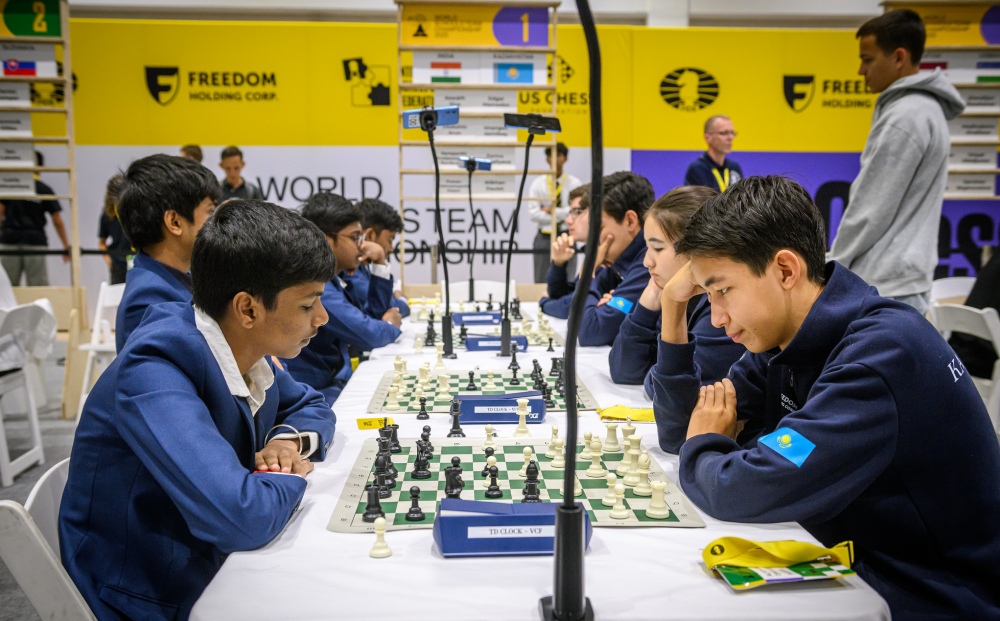
Day 3 of the World Schools Team Championship delivered another dose of high-stakes drama and memorable moments, both on and off the board. With two rounds played, the competition intensified as top contenders clashed, and underdogs continued to defy expectations. At the close of the day, India’s Velammal MHS School leads the event, holding strong as the tournament moves toward its final stage. All eyes in Round 5 turned to the top board, where a clash between the first and second seeds took centre stage. Kazakhstan’s National School of Physics and Mathematics faced off against Velammal MHS School in a match that lived up to the hype. With board one ending in a draw, it was the bottom two boards that made the difference; both claimed by the young Indian team, securing them a critical victory in the fight for first place. Meanwhile, Sri Lanka’s Royal College, Colombo continued their amazing run with another upset, this time against Slovakia’s Gymnázium, Grösslingová 18, Bratislava. The final score was 2.5-1.5, with all boards drawing except for board two, where the 1620-rated Sri Lankan player stunned his much higher-rated opponent (rated 2016) with a beautifully played finish. This victory propelled Sri Lanka into joint lead, setting up a highly anticipated Round 6 showdown against India with both teams entering the match on perfect scores. In this top-of-the-table encounter, between Velammal MHS School and Royal College, Colombo the Indian team proved too strong, claiming a convincing 3.5-0.5 victory over with two wins and two draws. The result solidified India’s position at the top of the standings heading into the final rounds. Away from the competition tables, the tournament continues to offer a wide range of activities designed to create a fun and social atmosphere for the players. As mentioned in previous updates, the players’ lounge remains a popular hangout, with its mix of games, beanbags, and chill-out zones. But the fun doesn’t stop there – each day wraps up with group activities, from basketball to nature walks, there are a lot of options for the kids to enjoy and socialize with each other. Today’s end of the day activity included a swanky silent disco – which, if you are older and haven’t heard of or experienced before yet (like me!) it is a party setting where music is played through individual headphones for every person. A wonderful setting for fun and to make new friends! Earlier in the day, and also ahead of the championship, players were treated to an excursion to the US Capitol, offering them the chance to take in some local history and culture. Tomorrow marks the seventh and eighth rounds of the tournament. With tensions mounting, and only one day left to play, the stage is set for an exciting finale that will determine the 2025 World Schools Team Champions. Moment of the day The result from round 5 with Sri Lanka’s Royal College beating the higher seed Slovakia’s Gymnázium, Grösslingová with a critical victory, is an incredible result in itself. But the way the decisive game ended made it even more memorable: White just blundered with 26.Qd4?? And suddenly the white king was in grave danger. Black pounced with 26…Qf3! (26…Nf3 was more accurate, but the move played was both elegant and effective). White tried 27.Nf4, defending the g2-pawn but it failed to 27…Nh3+! 28.Kh1 Nxf4 29.Rg1 Nxg2 30.Qb2 and White resigned, facing imminent checkmate after 30…Nf4+. Top 10 after Round 6 Smart Moves Summit Day two of the Smart Moves Summit focused on how chess connects with business, communication, and education. The day opened with a series of TED-style talks exploring the transformative power of chess, followed by a panel on sponsorships and strategic partnerships at the crossroads of chess and learning. Keynote speakers then discussed how to build sustainable school chess programs, and a roundtable discussion featuring top streamers and chess social media managers explored the growing role of social media, gaming, and online platforms in chess promotion. Alongside the main sessions, masterclasses covered topics such as inclusive environments, fair play through data, and effective training methods. As the summit concludes and the final rounds of chess approach, both the competitive and educational aspects of this event reflect the richness and global reach of the chess world. Written by: Charlize van Zyl Photos: Michal Walusza Official website: worldschoolteam2025.fide.com/
Making the case for chess in the classroom: The first day of the Smart Moves Summit
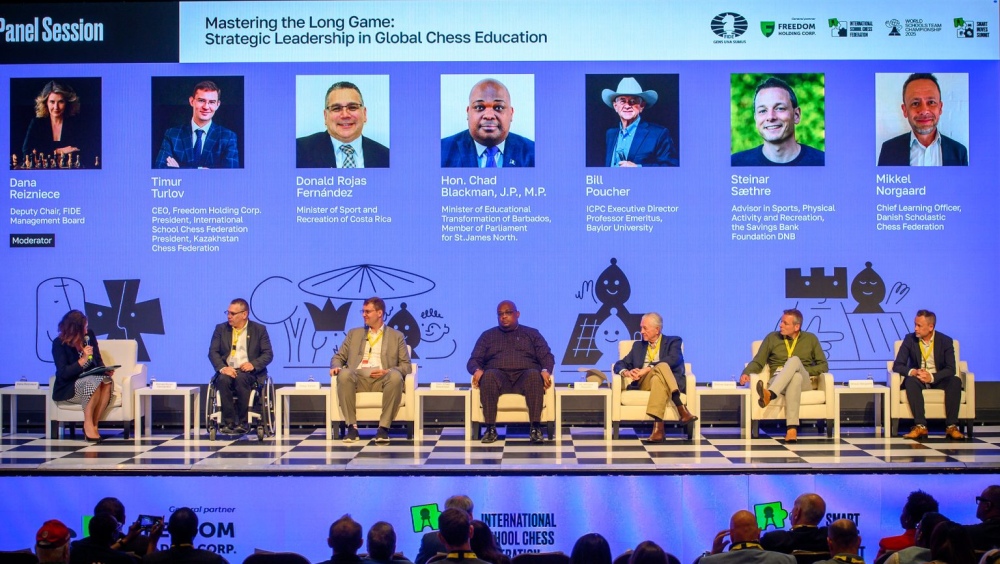
The Smart Moves Summit – a first of its kind global education conference focusing on the transformative power of chess in education – opened in Washington D.C. The prestigious Episcopal High School in Alexandria will, for two days, play host to government officials, scientists, researchers, EdTech entrepreneurs, innovators, and chess experts. The international conference aims to build a global framework for cognitive development through chess and promote the game’s role in education. The Smart Moves Summit is organised by FIDE and the International School Chess Federation (ISCF), with sponsorship from Freedom Holding. Congressman Jamie Raskin, of Maryland’s 8th congressional district, opened the event. Raskin, a prominent fan of the game and a staunch supporter of chess in education, noted that the U.S. Chess Center, a significant and historically noteworthy non-profit located in his district, has taught chess to over 40,000 students. Chess as a mechanism for non-violent conflict resolution Congressman Raskin noted the importance of chess “as a mechanism for non-violent conflict resolution and strategical critical thinking”. He argued that chess is crucial to solving modern societal problems, as it promotes critical thinking over propaganda, strategic planning over impetuous behaviour, and non-violent, diplomatic resolution over violence. “Chess can be a major part of the solution to the problems that beset Humanity right now. It seems like we’ve got a bunch of choices to make, what is? Are we going to try to promote critical thinking skills among young people, or are we going to promote Dogma and propaganda in fake news and conspiracy theory,” Raskin said. He noted that, while chess promotes healthy competition, this competition is ultimately with oneself to achieve higher levels of thinking, and must be linked with a sense of community. Congressman Raskin thanked FIDE President Arkady Dvorkovich and Freedom Holding CEO Timur Turlov for organising the Smart Move Summit, stating that their work is essential “to get us through the current crisis in world affairs in politics and in government”. Fighting for focus in a fast-moving world Timur Turlov, President of the ISCF and CEO of Freedom Holding, spoke about the challenges of living in a fast-moving world and the importance of adapting educational systems. He highlighted the “ability to keep concentration” as the most valuable asset in an attention economy, and proposed that chess is an excellent tool to train this skill. Turlov gave details of an initiative to implement chess in over 500 schools in Kazakhstan, with plans for more, and mentioned that scientific studies are underway to measure the results. “We believe that the most valuable thing in our life now is our ability to keep concentration… and I really believe that chess could be a very great tool to overcome this challenge. Because chess is a very interesting game, it’s a game that can keep your attention for a long period of time and is a beautiful way to train your ability to concentrate,” Turlov said. Arkady Dvorkovich on the importance of school chess championships for children In his address, FIDE President Arkady Dvorkovich highlighted the importance of evolving educational systems to keep pace with rapid technological change. He argued that despite technological advancements, personal interaction remains key to the exchange of ideas and improvement. Advocating the vital role chess has in education, Dvorkovich pointed out that events such as school championships, which put children in different settings to their everyday lives, are an important point of communication breeding progress. “The whole idea of the World Schools Team Championship also came from that Soviet tradition,” Dvorkovich said. “My father was involved in that. By introducing chess into the educational system, we put students in these situations that are unknown in the classroom since they have to face a different world… they have to face some moves that matter, some smart moves, and they start thinking about how those pieces interact and how to think about the whole chessboard, and the surrounding, not just about one square.” Real examples: How chess is changing education and improving societies The first day of the Smart Moves Summit featured five panel discussions and a workshop. The topics included the role of chess in early and primary education, a global case study analysis on using chess to advance gender and socio-economic equality, and the opportunities of digital and educational platforms to harness the game’s power. Other sessions focused on aligning chess-based learning methodologies with public education goals, and a chess and math workshop. The central event of the day was a panel titled “Strategic Leadership in Global Chess Education,” which discussed long-term strategies, cross-sector collaboration, and how to drive initiatives to include chess as a part of official government policies. Moderated by Dana Reizniece, Deputy Chair of the FIDE Management Board and the former Latvian Minister of Finance, the session featured government officials and program heads of organisations focusing on chess in education. Timur Turlov, CEO of Freedom Holding, set the stage by describing chess education as a “long-term investment” in the mindset of an entire generation rather than “charity”, as its often seen. “Strategy, self-control, attention management, the ability to think as part of a team—these are skills no modern leader can do without,” Turlov said. “And if we want these questions to develop internationally, we must integrate chess into the education system as a core subject.” Turlov concluded by outlining his goal to build a global exchange platform for best practices in work and life principles, built through chess. The discussion quickly shifted to the political and practical implementation of chess. Costa Rican Minister of Sport and Recreation Donald Rojas Fernández shared compelling data from pilot programs, revealing a decrease in bullying and an average eight percent increase in math and science grades among students who learned chess. “The numbers don’t lie,” Fernandez stated, underscoring that the positive academic and social outcomes of implementing chess in education. This also helped influence the decision of the government of Costa Rica to make chess a national priority. Echoing this sentiment, Minister Chad Blackman of Barbados
A day of fierce matches and lasting friendships at WSTCC 2025
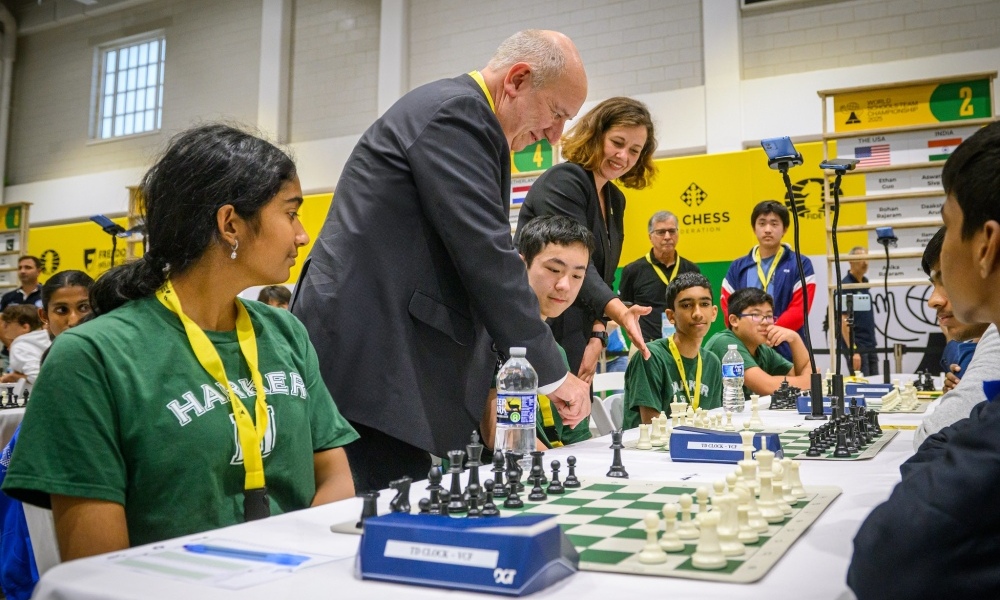
The World Schools Team Championship in Alexandria continued with great momentum today, as two more rounds were completed. The intensity of the competition is growing, with three teams – Kazakhstan’s National School of Physics and Mathematics, India’s Velammal MHS School, and Sri Lanka’s Royal College, Colombo still leading the standings on a perfect score. As the tournament progresses, the atmosphere on and off the board continues to reflect not just the fierce competitive spirit, but also the unique camaraderie that makes this event so special. Shortly before 10:00, the playing hall was alive with anticipation. Students filled the space, eager to begin their games. Some had started the day with a walk around the scenic grounds of Episcopal High School, enjoying another bright and sunny morning. Others spent time in the vibrant players’ lounge, where activities like air hockey, table tennis, and, naturally, casual games of chess offered a fun way to relax before the serious matches began. Despite their different routines, the shared feeling among all the participants was one of excitement and good spirits as they returned to the boards. One of the core messages of this championship is “friendship” – the kind that transcends borders and is often born through shared love for chess. This sentiment came to life today in touching ways, as players exchanged thoughtful gifts from their home countries with their opponents. From decorative trinkets to fridge magnets, these simple gestures spoke volumes about the bonds being formed. It is clear that, beyond the chessboard, meaningful connections are being made here at the World Schools Team Championship. On the competitive front, the battles are intensifying. The tournament favourite, the National School of Physics and Mathematics, has delivered a commanding performance so far, with each board maintaining a perfect score and no points dropped. Not far behind, India’s Velammal MHS School is also showcasing remarkable consistency, having conceded just a point and a half (three draws) across all rounds. Their strategy of placing lower-rated players on the top boards continues to spark intrigue. Among today’s standout performances was Sri Lanka’s Royal College, Colombo. The team made waves in the third round by stunning the 8th-seeded English side, Hampton School, with a resounding 4-0 victory. In the fourth round, they faced the third seed, University High School, and dominated the match 3:1 continuing their impressive journey on this global stage. Moment of the Day The moment of the day comes from the Round 3 match between Velammal MHS School and US The Harker School on board 2 where IM Arun Daakshin delivered a crushing final move in this position, which was met with an immediate resignation by Black. The move is 24.Qxf6!! The squares around the black king are completely dominated by White. If 24…Kxf6 then 25.Be5# game over. Looking ahead, tomorrow’s pairings promise exciting matchups as the Swiss system begins pitting the top teams against one another. With the leaderboard tightening, the battle for the championship title is about to enter a thrilling phase. Top 10 after Round 4 Smart Moves Summit Parallel to the chess battles, the Smart Moves Summit kicked off today – a two-day conference spotlighting the powerful role chess can play in shaping education. With 15 scheduled topics, the summit brings together thought leaders, educators, and policymakers to explore chess as a tool for leadership, inclusion, and innovation. The day began with an official opening ceremony and flowed into panels that addressed various themes, from global leadership in chess education and its integration in early childhood learning, to increasing inclusivity and leveraging AI in educational technology. The day concluded with a thought-provoking session on methodology, policy development, and public sector collaboration. Alongside the panels, two masterclasses provided hands-on insight into using chess for cognitive development in early learners and the dynamics of strategic gameplay. The second and final day of the Smart Moves Summit will take place tomorrow, August 5, alongside rounds 5 and 6 of the championship. As the tournament heats up and the summit continues, Alexandria remains the center of both high-level chess and meaningful dialogue about the game’s future in education. Written by: Charlize van Zyl Photos: Michal Walusza Official website: worldschoolteam2025.fide.com/
Opening moves in Alexandria: World Schools Team Championship 2025 begins
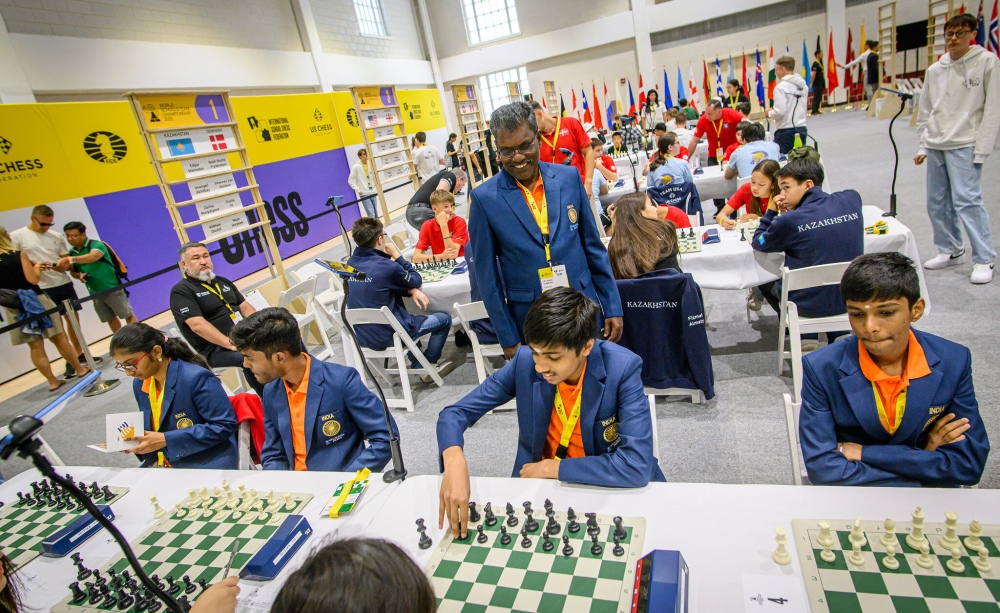
The World Schools Team Championship 2025 officially got underway at Episcopal High School, located in the historic city of Alexandria, just outside Washington, D.C. A flagship event in the global scholastic chess calendar, the tournament brings together hundreds of students representing nearly 50 countries. While the players are here to compete for international glory, the championship is equally a celebration of friendship, diversity, and shared passion for the game of chess. With participants ranging from unrated newcomers to seasoned International Masters, the tournament features a remarkable mix of talent and potential. This variety has already led to a wide spectrum of exciting games in the early rounds. At the top of the starting rankings is Kazakhstan’s National School of Physics and Mathematics, led by newly titled Grandmaster Edgar Mamedov, with a formidable average rating of 2229. Close behind is India’s Velammal MHS School, averaging 2210. The host country, the United States, is represented by four schools. Leading the American contingent is University High School, which holds third place in the starting rankings with an average team rating of 2003. The tournament’s first round began promptly at 11:30. Ceremonial first moves were made on the top four boards by distinguished guests: FIDE President Arkady Dvorkovich, President of the International School Chess Federation Timur Turlov, Minister of Educational Transformation of Barbados Hon. Chad Blackman, and Minister of Sport and Recreation of Costa Rica Donald Rojas Fernández. In the opening round, the top-seeded teams performed as expected, securing confident victories over their lower-ranked opponents. However, the second round saw the competition intensify as more closely matched teams faced off across the boards. By the end of the day, 11 teams secured wins in both rounds and concluded Day 1 with a perfect score of 4 match points. KAZ – National School of Physics and MathematIND – Velammal MHS SchoolENG – HamptonKAZ – Seed Educational ComplexNZL – Wellington CollegeSRI – Royal College, ColomboKAZ – Astana 2 RSPMUSA – The Harker SchoolSGP – Raffles InstitutionGRE – 1st General Lyceum of XanthiAUT – Privates Gymnasium Sacre Coeur Wien Moment of the day SUI – Kantonsschule Alpenquai Luzern SGP vs Raffles InstitutionBoard 4: Infanger, Philip vs Loh, Yang Hao Our moment of the day comes from board 4 in the match between Singapore’s Raffles Institution and Switzerland’s Kantonsschule Alpenquai Luzern. The match delivered one of the day’s biggest surprises, as the 19th-seeded Raffles Institution defeated the fifth seed by a commanding 3:1 score. The spotlight moment unfolded in a tense endgame after a rollercoaster battle where both sides had chances. In the critical position, White played 60.Kd5??, a decisive mistake that allowed Black to break through with 60…Kg6 61.Ke5 h5 62.gxh5 Kxh5. With the white king cut off, it could no longer stop Black’s advancing passed pawn, especially with the black king perfectly placed to shepherd it forward. Instead, the correct move was 60.Kf3, keeping the white king in front of the pawns, and ready for opposition – a key principle in pawn endgames. One possible line would be 60…Kg6 61.Kg3 h5 62.gxh5 Kxh5 63.Kh3, where the white king maintains opposition, denying Black any meaningful progress. Rounds 3 and 4 will be played on Monday, August 4, and after eight rounds, the tournament champions will be crowned on August 6. As the competition continues, so does this unique celebration of youth, talent, and international friendship through chess. Photos: Michal Walusza Official website: worldschoolteam2025.fide.com/
Let the games begin: Celebrating the start of the World Schools Team Championship 2025
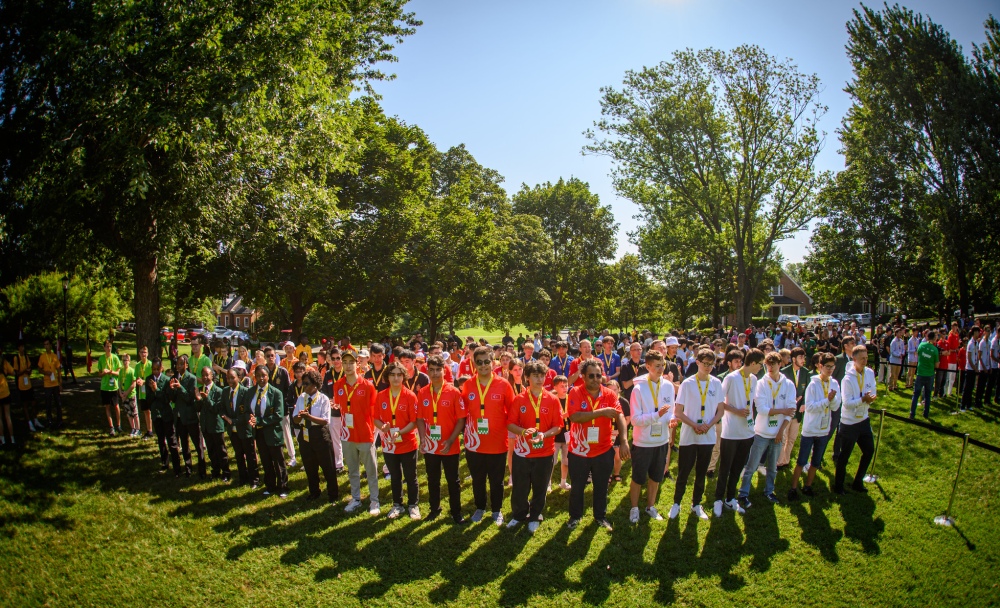
The opening ceremony of the World Schools Team Championship 2025 began with a colorful Parade of Nations, featuring players from more than 50 countries including India, China, the United States, and Norway. This was followed by the official transfer of ownership from FIDE to the International School Chess Federation, after which the event was formally declared open. The tournament officially commenced on August 3, 2025, in the historic city of Alexandria, Virginia. Hosted at Episcopal High School, just outside Washington, D.C., the venue offers a beautiful campus with modern facilities and rich tradition, an ideal setting for a tournament that encourages critical thinking, fair play, and global connection. This event will bring together over 50 teams from around the world, uniting young chess players in a truly international competition. Unlike a traditional indoor event, the opening ceremony embraced the sunny weather and took place outdoors on the grass lawn in front of the Hoxton house dormitory. Schools lined up in alphabetical order, and one by one, teams marched toward the front stage, proudly holding their country’s flag. The ceremony host introduced each team over the speakers, with upbeat music playing in the background to energize the crowd. The audience responded with loud applause, giving every team their moment in the spotlight. After all the teams had been welcomed, the national anthem of the United States played, followed by the FIDE anthem. FIDE President Arkady Dvorkovich then took the stage to pass the championship flag to Timur Turlov, President of the International School Chess Federation (ISCF). This symbolic gesture marked the official transfer of responsibility for the event to the ISCF. “Following the World Corporate and the World Rapid & Blitz, this is the third major global chess event we are hosting in the U.S. in just over a year, and we hope to do more. We are eternally grateful to our partners, particularly Freedom Holding and Mr. Timur Turlov – for their generous support for chess globally, at all levels. And on this note, it is my honour to formally entrust the International School Chess Federation with care and stewardship over the FIDE World Schools Team Championship,” said Arkady Dvorkovich, President of FIDE. Timur Turlov followed with a speech highlighting the educational value of chess and the importance of making the game accessible to children everywhere. “Chess is not just a sport. It’s a way of thinking. It teaches discipline, decision-making, and the ability to see the consequences of your actions. It’s a game that shapes the kind of thinking every person needs – in life, in his or her career, in society. I say this not only as the head of a federation, but as a father whose children play chess. I see, game after game, how they learn to think, to be patient, to win – and sometimes to lose with dignity. Chess is a school of life. And we want more children around the world to have access to this beautiful game,” said Timur Turlov, President of the International School Chess Federation. He ended his speech by officially declaring the World Schools Team Championship 2025 open, drawing a warm round of applause from the crowd. The opening ceremony was attended by distinguished guests and prominent figures from the global chess and academic communities. Among them were present Dr. Bill Poucher, Executive Director of the International Collegiate Programming Contest (ICPC), ACM Fellow, and Professor of Computer Science at Baylor University, recognized for his decades-long contributions to computer science and innovation and Dana Reizniece, former Latvia’s Minister of Economics and Minister of Finance, and current FIDE Deputy Chair. Their presence underscored the significance of the event and its role in shaping the future of scholastic chess worldwide. Applications are now open to host the next World Schools Team Championship! National chess federations, educational institutions, and event organizers interested in hosting the tournament are invited to submit their proposals. Please include a description of the venue, infrastructure, and a letter of intent. All applications should be sent to: info@ischoolchess.com For more information and the full program, please visit the official website of the Federation and follow our social media accounts – exciting, inspiring, and unforgettable moments lie ahead! More information: Championship website: worldschoolteam2025.fide.com/ Summit website: worldschoolteam2025.fide.com/summit/ ISCF website: ischoolchess.com/ General Partner: Freedom Holding Corp.Join us in Washington, D.C. / Alexandria from August 2–7, 2025.
Magnus Carlsen wins first ever edition of Chess Esports World Cup

Magnus Carlsen representing Team Liquid took home gold in Riyadh after a dominant performance against Team Falcons’ Alireza Firouzja in Chess at EWC 25. Carlsen added another trophy to his legendary résumé on August 1, defeating Alireza Firouzja in the Grand Final of Chess at 2025 Esports World Cup. The Norwegian grandmaster crushed his opponent with an overall score of four wins, two draws, and a single loss. The gap between the world’s No. 3 Blitz player, Alireza Firouzja (2856), and the world No. 1, Magnus Carlsen (2937), couldn’t have been more apparent after the action concluded in Riyadh. The chess competition at the Esports World Cup consisted of two stages. In the group stage, the sixteen players from thirteen teams were divided into four groups and competed in a GSL-style double elimination bracket for eight spots in quarterfinals. The playoffs were an eight-player single-elimination bracket. The teams that lost in the semifinals competed in a third-place match. All matches in the playoffs were best-of-threes but the final was a best-of-five. A dominant opening Carlsen looked sharp in the opening set, claiming a win and two draws to put the score at 3-1, securing a commanding lead. Having to reset going into the second set, Firouzja’s impressive retort saw Magnus blunder his rook after 50 moves, leading to Firouzja’s only win of the series. Clearly unhappy, Carlsen shot back in the second game, punishing Firouzja with his calculating play. Firouzja looked pressed, burning through much more of his clock than Magnus. The difference between the two became even more obvious with each player’s heart rate displayed on screen. Carlsen remained calm and collected throughout the majority of the final. A blunder by Firouzja in game three pushed the series to 2-1, with Magnus on match point. And just like that, it was over. A weak opening by Firouzja was punished by Carlsen, who ultimately defeated the French GM in just two sets. “I’ve got my bow and arrow ready” Early in the event, Magnus had been supremely confident. Responding to a Team Falcons trash-talking tweet in an interview, he stated that the Falcons “better do well in other games because you’re not going to win chess.” Then, following his victory over Falcons’ Hikaru Nakamura in the semifinals, he doubled down. “It pissed me off when they cheered when Hikaru was winning,” he said. “I’ve got my bow and arrow ready, I’ve shot one Falcon, I want to shoot one more tomorrow.” With two Falcons skewered, Magnus takes home the win for Team Liquid, earning 1,000 Club Championship points and rocketing them into contention to win the Club Championship. The grandmaster also wins $250,000 – one of the largest competitive chess prizes in recent memory. Firouzja’s second-place finish locks Team Falcons in second place on the Club Championship leaderboard, still lacking the first-place finish required to win the overall club trophy. He also pockets the $190,000 second-place prize. Earlier in the day, Hikaru defeated Arjun Erigaisi in the third-place match, a best-of-six series. With his teammate Firouzja in the final, Nakamura’s points do not count toward Team Falcons’ total, but he will take home $145,000. Erigaisi claims $115,000 in prize money for fourth place, along with 300 Club Championship points for Gen.G. Text and photos: esportsworldcup.com/ Official website: esportsworldcup.com/en/competitions/chess
FIDE World Youth Championships 2025: Registration deadline extended to August 15
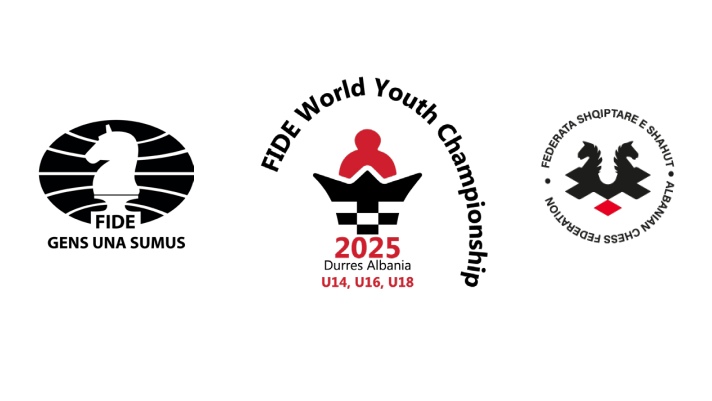
Dear Delegates and Participants, We hereby inform you that, following increased demand from several countries, the registration deadline for the FIDE World Youth U14, U16, U18 Chess Championship 2025, October 3-16, 2025 held in Durrës, Albania has been officially extended to August 15, 2025. To date, we have received over 600 registrations, and the number is expected to grow significantly in the coming days. We kindly urge all delegations to proceed with registration and hotel arrangements without delay. Due to high demand, additional rooms may be requested but cannot be guaranteed after the deadline. Single room availability is limited. Delegations are strongly encouraged to opt for shared accommodations (double/triple rooms) to ensure efficient allocation and access for all participants. We appreciate your cooperation and look forward to welcoming you to Albania this October. Best regards, Organizing Committee FWYCC 2025 The 2025 FIDE World Youth Chess Championships (U14, U16, and U18) will be held in Durrës, Albania, from October 3 (arrival) to October 16 (departure). Each national federation may register one official player in each category (Under 14, Under 16, and Under 18, Open and Girls). This totals six official players plus one accompanying person (with a valid FIDE ID) per federation, all of whom are invited by the organizers. Registration deadline: August 15, 2025. Invitation letter and regulations (PDF) FIDE World Youth Chess Championships 2025 official website: worldyouth2025.fide.com E-mail: worldyouth@fide.com
World Women’s Team Championship 2025 heads to Linares, Spain

Photo: Michal Walusza The FIDE World Women’s Team Championship 2025 is set to take place in the legendary chess city of Linares, Spain, from November 17 to 24. Known as one of the most iconic venues in chess history, Linares will once again be in the global spotlight as it welcomes 12 of the world’s strongest women’s national teams to compete for the prestigious world title. “I am very excited that the Championship goes to Linares. The city is famous for its rich chess tradition – however it is not only about the past, but also the present and the future. I’d like to thank the local chess community and the Spanish Chess Federation for the cooperation, and we look forward to an exciting event,” said Emil Sutovsky, FIDE CEO Photo: European Best Destinations First held in 2007, the FIDE World Women’s Team Championship has become one of the most important events on the women’s chess calendar. Previous winners include China, Russia, Ukraine, and Georgia (reigning champion), with China claiming a record four titles. The event not only crowns the best national women’s team in the world, but also showcases rising stars and team spirit. The 12 teams competing in Linares are: * Semi-finalists of the 2023 edition: Georgia France Kazakhstan USA * Top-rated teams from each continent: China (Asia) Ukraine (Europe) Peru (Americas) Egypt (Africa) * Top federations by average rating (August 2025): India FIDE Team * Host nation: Spain * FIDE President’s nomination: To be announced The championship features 12 teams, split into two pools of six for a round-robin stage. The top two teams from each pool will advance to the knockout stage, consisting of semi-finals and a final. Each match between two teams consists of four boards, and matches are played under the standard time control: 45 minutes + 30 seconds per move from move one. Full regulations for World Women’s Team Championship 2025 (PDF)
2025 2nd FIDE Council Meeting: List of Decisions
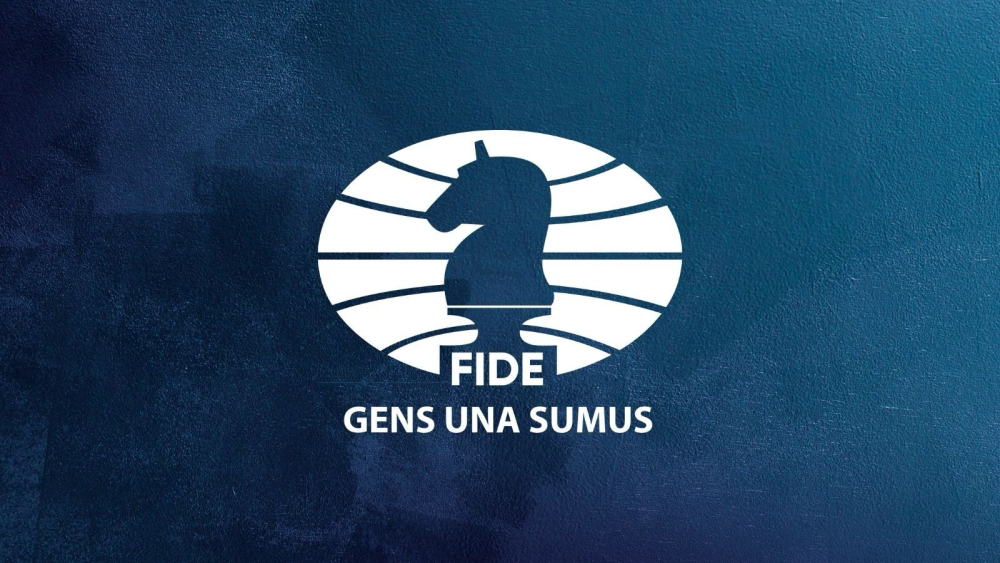
2nd FIDE Council meeting 18 July 2025 Online List of decisions CM2-2025/01 To note President’s report. CM2-2025/02 To approve Treasurer’s report. CM2-2025/03 To allow a team of athletes of Russian nationality to participate in the 2025 Women’s World Team Championship under the FIDE flag subject to receiving a non-objection letter from IOC, and to continue consultations with IOC regarding possible participation of Russian and Belarus nationals in the future team competitions. CM2-2025/04 To note FIDE Calendar 2025/2026. CM2-2025/05 To note the Global Strategy Commission’s report. CM2-2025/06 To note the Arbiters’ Commission’s report. CM2-2025/07 To approve the recommendations of the Arbiters’ Commission on Seminars, Classification upgrades, Amendments to the lecturer list, FA norms and titles. CM2-2025/08 To note the Qualification Commission report. CM2-2025/09 To approve the recommendations of the Qualification Commission on titles. CM2-2025/10 To approve in principle Swiss Chess Federation’ request to convert their National ratings to FIDE ratings for their players. To authorize the Qualification Commission to set the exact terms for this procedure. CM2-2025/11 To approve the recommendations of the Trainers’ Commission on titles and Academies. CM2-2025/12 To approve the recommendations of the Events Commission on titles. CM2-2025/13 To approve the recommendations of the Chess in Education Commission on titles. CM2-2025/14 To note the Fair Play Commission’s report. CM2-2025/15 To approve the recommendations of the Fair Play Commission on titles. CM2-2025/16 To authorize the President to consult with respective Commissions and formulate the Council’s decision in respect of the Rules Commission’s proposal regarding the Fair Play. The decision shall be along the lines of the President’s proposal at the Council’s meeting. CM2-2025/17 To note the Commission’s for Women’s Chess report. CM2-2025/18 To note the Rules Commission’s report CM2-2025/19 To note Continental Presidents’ reports. CM2-2025/20 To send a letter to the Panama Chess Federation regarding the tournaments organized in Panama. CM2-2025/21 To note the report of the Reverse Delegate for the USVI Chess Federation. To request the Constitutional Commission’s advisory opinion for this matter. CM2-2025/22 To note the report of the Reverse Delegate for the Burkina Faso Chess Federation. CM2-2025/23 To approve the proposed procedure regarding the previous and new Federations of Burkina Faso, to request the Constitutional Commission’s opinion as part of the relevant process, and to include the corresponding agenda item for the 2025 General Assembly consideration. CM2-2025/24 To note the report of the Reverse Delegate for the Syria Chess Federation. To request the Constitutional Commission’s advisory opinion for this matter. CM2-2025/25 To note the update on the FIDE Social Year 2025. CM2-2025/26 To organise the FIDE General Assembly 2025 online. 2nd FIDE Council Meeting 18 July 2025 – List of decisions (PDF)

